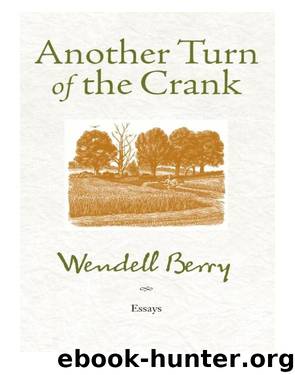Another Turn of the Crank by Wendell Berry

Author:Wendell Berry
Language: eng
Format: epub
Publisher: Counterpoint
Published: 2011-07-01T16:00:00+00:00
Thirty years ago, one of the organizations leading the fight against strip mining was the Appalachian Group to Save the Land and the People. This seemed an exemplary organization—an informed local response to a local calamity—and I was strongly affected and influenced by it. What most impressed me was the complexity of purpose announced in its name: it proposed to save the land and the people. This seems to me still an inescapable necessity. You really cannot specialize the work of conservation. You cannot save the land apart from the people or the people apart from the land. To save either, you must save both—that is a lesson taught nowhere better than in the economic history of the Commonwealth of Kentucky. To save both the land and the people, you need a strong rural economy. In truth, you need several strong rural economies, for even so small a state as ours has many regions, and a good economy joins local people conservingly to their local landscapes.
If we are serious about conservation, then we are going to have to quit thinking of our work as a sequence of specialized and temporary responses to a sequence of specialized and temporary emergencies. We will have to realize finally that our work is economic. We are going to have to come up with competent, practical, at-home answers to the humblest human questions: How should we live? How should we keep house? How should we provide ourselves with food, clothing, shelter, heat, light, learning, amusement, rest? How, in short, ought we to use the world?
No conservation issue could lead more directly to those questions than the issue of Kentucky forestry. It is true that our state contains some sizable areas of private or public forest land, but we cannot proceed on the assumption that we are dealing with large tracts of timber or that we can ever hope to conserve our forests solely by forest conservation policies, however enlightened.
In Kentucky we have 12,700,000 acres of forest, more than 90 percent of which is privately owned. We must assume, I think, that many of the 440,000 owners of this land would fiercely oppose any public appropriation of their modest properties or any diminution of their rights therein. Although I know very well the dangers to the common wealth and health inherent in private property rights, I would be one of those fierce opposers.
The first of my reasons is my too little faith in the long-term efficacy of public stewardship. Perhaps the public will prove equal to the task of wilderness preservation, though that is by no means certain. But it’s not easy to imagine the conditions under which highly competent and responsible public stewardship of land that is in use might be maintained for many generations and through the inevitable changes of politics and economics.
My second reason is that I do have some faith in the long-term efficacy of private stewardship, again provided that the connection between the people and the land can be made secure.
Download
This site does not store any files on its server. We only index and link to content provided by other sites. Please contact the content providers to delete copyright contents if any and email us, we'll remove relevant links or contents immediately.
| Diaries & Journals | Essays |
| Letters | Speeches |
The Rules Do Not Apply by Ariel Levy(4969)
Bluets by Maggie Nelson(4556)
Too Much and Not the Mood by Durga Chew-Bose(4348)
Pre-Suasion: A Revolutionary Way to Influence and Persuade by Robert Cialdini(4232)
The Motorcycle Diaries by Ernesto Che Guevara(4098)
Walking by Henry David Thoreau(3962)
Schaum's Quick Guide to Writing Great Short Stories by Margaret Lucke(3380)
The Daily Stoic by Holiday Ryan & Hanselman Stephen(3317)
What If This Were Enough? by Heather Havrilesky(3311)
The Day I Stopped Drinking Milk by Sudha Murty(3197)
The Social Psychology of Inequality by Unknown(3029)
Why I Write by George Orwell(2952)
Letters From a Stoic by Seneca(2797)
A Short History of Nearly Everything by Bryson Bill(2698)
A Burst of Light by Audre Lorde(2607)
Insomniac City by Bill Hayes(2555)
Feel Free by Zadie Smith(2479)
Upstream by Mary Oliver(2389)
Miami by Joan Didion(2367)
